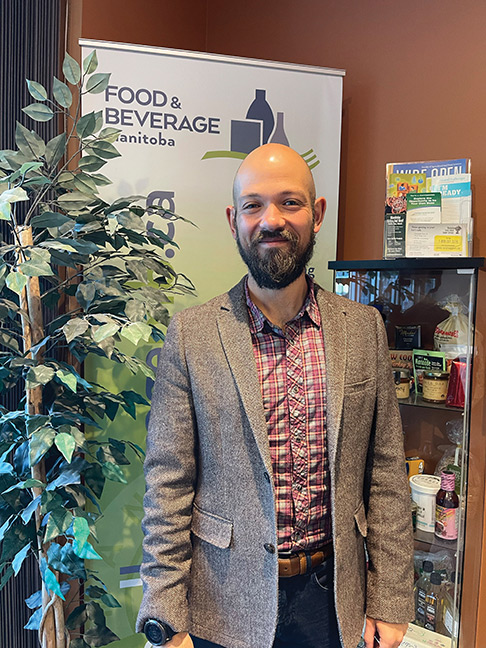Food & Beverage Manitoba Working On Initiatives Aimed at Overcoming Worker Shortages
Advertisement
Read this article for free:
or
Already have an account? Log in here »
To continue reading, please subscribe:
Monthly Digital Subscription
$0 for the first 4 weeks*
- Enjoy unlimited reading on winnipegfreepress.com
- Read the E-Edition, our digital replica newspaper
- Access News Break, our award-winning app
- Play interactive puzzles
*No charge for 4 weeks then price increases to the regular rate of $19.00 plus GST every four weeks. Offer available to new and qualified returning subscribers only. Cancel any time.
Monthly Digital Subscription
$4.75/week*
- Enjoy unlimited reading on winnipegfreepress.com
- Read the E-Edition, our digital replica newspaper
- Access News Break, our award-winning app
- Play interactive puzzles
*Billed as $19 plus GST every four weeks. Cancel any time.
To continue reading, please subscribe:
Add Free Press access to your Brandon Sun subscription for only an additional
$1 for the first 4 weeks*
*Your next subscription payment will increase by $1.00 and you will be charged $16.99 plus GST for four weeks. After four weeks, your payment will increase to $23.99 plus GST every four weeks.
Read unlimited articles for free today:
or
Already have an account? Log in here »
Hey there, time traveller!
This article was published 30/10/2021 (1501 days ago), so information in it may no longer be current.
While the COVID-19 pandemic has caused a shortage of workers in a variety of industries over the past 18 months and counting, it isn’t entirely to blame for a worker shortage in the food industry, says Mike Mikulak, executive director of Food and Beverage Manitoba.
“To be honest, the problems were here before, for over a decade,” he says. “While it’s tempting to blame COVID for worker shortages, we can’t.”
That said, the pandemic has exacerbated an already challenging situation.

Food producers across the province – from big to small – are struggling to find workers at a time when the demand for quality food is at an all-time high.
Consequently, Food and Beverage Manitoba is developing initiatives aimed to put the industry in a more positive light.
“We are launching a new initiative that will focus on attracting diverse talent to our sector that’s called I.D.E.A.,” explains Mikulak. “The letters stand for Inclusion, Diversity, Equity and Access.”
The initiative, he notes, has been designed to start off at the most fundamental level: providing a greater level of comfort for prospective workers.
“Our goal is to make workplaces more welcoming and to encourage diversity for different workers, such as those that come from Indigenous and LGTBQ+ communities,” he says. “We want our workforce to be able to better represent the people it serves.”
At the same time, training will be provided to businesses to help them do a better job of attracting and maintaining workers.
“We are launching a new initiative that will focus on attracting diverse talent to our sector that’s called I.D.E.A.”
-Mike Mikulak,
Executive Director of Food and Beverage Manitoba.
“We want to meet businesses where they’re at, and to provide pathways to improvement by helping them in areas such as policy and procedures. It’s really important that we work at creating inclusive, welcoming places to work.”
Part and parcel of that, says Mikulak, is to tailor training to the needs of different companies, which can range in size from a huge employer like Maple Leaf down to a small family-run operation that employs 10 people.
“Every company is in a different place, so each company will have different training needs. In working with partners like the Winnipeg Poverty Reduction Council, we hope to create a playbook to provide to companies, especially those with limited resources.”
In essence, the new initiatives are based on human-centered design principles.
“We will provide leadership training to enact sound policies that filter down to frontline staff in a clear manner,” Mikulak says. “Companies need us to provide this kind of training because they’re busy, and frankly, they’re short on employees. Things are very difficult right now.”
However, while the current worker shortage is challenging everyone, there have been some positive developments.

One example is Maple Leaf, which has committed to hiring 300 new staff for a new ready-made bacon facility.
“Because of the tight labour market, even a good news story has its downsides. Now, smaller companies will have to compete with a diminishing pool of workers.”
Still, that development shows progress is being made.
Clearly, more changes must be made to show people – particularly Millennials and those looking to change jobs – that the food industry is a viable option.
“Another initiative we’re working on is aimed at Millennials, who want to be involved in finding solutions to societal problems, and who want greater work-life balance. In short, both they, and other demographics want to work for a company that wants to make the world a better place,” he says. “Companies need to evolve in that direction.”
If companies can do that – and provide more welcoming, inclusive workplaces – the food production industry has a fighting chance to break out of its decade-long worker shortage.
“We want to attract workers from all walks of life, as well as those who are looking to shift jobs,” Mikulak says. “And we also want to attract talent that left Manitoba back to the province.”
The good news is that positions are open right across the spectrum.
“There’s actually a lot of diversity in the industry. You can work in areas from production, to logistics, food safety, even business development. Our goal is to show people that the industry isn’t just about long hours and hard, dirty work,” he says. “It actually provides lots of opportunities to be part of something that will provide them with a good living and the joy of providing sustenance for others.”

